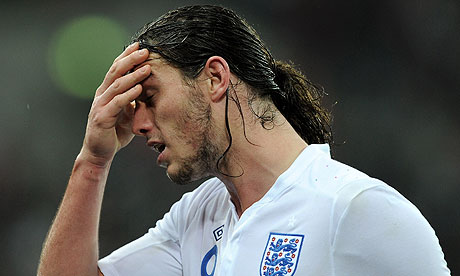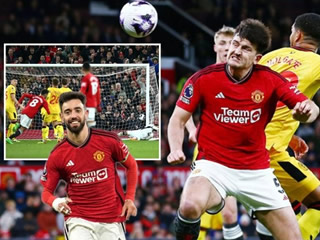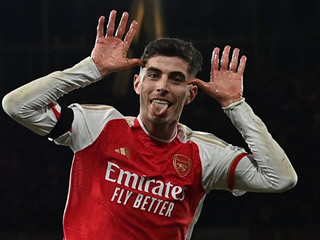England remain lost in time as France expose same old failings
Posted Friday, November 19, 2010 by theguardian.com
Fabio Capello's team are stuck: between generations, styles of play and even national training centres

Andy Carroll's inclusion against France emphasised England do not know how they are supposed to be playing.
The booing that greeted the final whistle was muted on Wednesday night, but then most of England's supporters had already left, taking their feelings with them. Many of those who remained may have concluded that jeers would have represented a poor response to France's fine display, which was at least as much to blame for the night's result as the home side's ineptitude.
What they had seen was a match crystallising the seemingly eternal dilemma facing English football on the international stage, something that goes back to the foggy November afternoon in 1953 when Ferenc Puskas's Hungarians arrived to demonstrate a style of play based on accurate one- and two-touch passing, close support, elusive movement and patience – the very means by which Laurent Blanc's side prevailed this week.
The scoreline may have been less spectacular, but once more England's players were exposed as artisans without an inherent sense of architecture to match that of the world's most advanced international sides, among whom France might very well be numbered once again by the time the Euro 2012 finals come around.
This was Fabio Capello's first defeat at Wembley, which could be seen as not too dreadful when set against 13 wins and two draws. But of the night's many statistics, the most telling was the one that said that, during his tenure, England have played seven matches against nations with World Cup or European Championship wins on their record, and lost five of them while winning only one. England may be ranked sixth in Fifa's world table, but the true story of the past few years has been one of gradual and seemingly inexorable decline, barely camouflaged by the worldwide success of the Premier League.
The popularity of the domestic competition is based on its roots in a tradition of passionate intensity and unremitting competitiveness. The exotically talented foreigners bought in with Rupert Murdoch's money have added the element of decoration. At its increasingly rare best, the Premier League presents an ideal combination of the Real Madrid of the 1950s and the Liverpool of the 1970s. But it is the 62% of foreign players, rather than the 38% of England-qualified representatives, who provide its box-office appeal.
Seldom have the technical deficiencies of England's own players been as comprehensively exposed as they were by Samir Nasri, Florent Malouda and their colleagues. Only in the latter stages, when the French were tiring and England threw everything into a final assault, did it begin to resemble a contest between equals, but even then it was Premier League-style frenzy that enabled the home side to register a consolatory goal rather than the sort of strategic intelligence which wins World Cups.
Although raw passion is supposed to be England's trump card, the expectation that a moment of transcendent energy – probably contributed by Steven Gerrard – will rescue the occasion is actually their achilles heel. The selection of Andy Carroll, blameless on the night, emphasised that England still do not know whether they are supposed to be playing the old way, thumping long balls upfield for the big man to lay off (in which case, why was he not given the sort of support Shola Ameobi provides at Newcastle?), or the new way – new to England, that is – which involves complexity and precision. The painful truth is that they are equipped for only one of these approaches, and it is not the method favoured by Spain, Germany, and Blanc's new-look France.
When the Football Association yielded to pressure from the Premier League clubs and closed down the national school of excellence at Lilleshall in 1999, France had just demonstrated, in the form of victory in the World Cup, the value of a carefully monitored system of educating young players. They would go on to win Euro 2000. The continuing value of Clairefontaine and its regional satellites was proved yet again by the nature of Wednesday's performance, and by the fact that 41 Frenchmen are playing play in the Premier League.
England are stuck not just between styles of play but between the end of Lilleshall and the FA's interminable procrastination in building the promised centre at Burton on Trent, whose primary ambition is to produce coaches capable of instilling a greater degree of technical and tactical sophistication into young players. Such a policy – "coaching the coaches" – was fundamental to the approach of Gérard Houllier and his colleagues at the French football federation when they laid out the blueprint of their centres de formation 20 years ago. Now we count the cost of England's delay in following an example that was clear for all to see.
Stuck, too, between generations: that of Gerrard, Rio Ferdinand, Frank Lampard, Ashley Cole, Peter Crouch, Gareth Barry and John Terry, all either in or on the brink of their 30s, and the one represented on Wednesday by Andy Carroll, Kieran Gibbs, Theo Walcott, Jordan Henderson and Micah Richards, who are 20, 21 or 22. Where are the players aged 26, 27, or 28, the prime years for top footballers? Darren Bent, Carlton Cole, Jermain Defoe and Jay Bothroyd may be the best strikers in that age range qualified to play for England, but their combined experience of the Champions League amounts to exactly three matches – two to Defoe's credit, in this year's qualifying round, and four minutes for Cole in a group match with Chelsea five years ago.
Gordon Taylor, the chief executive of the players' union, highlights the problem created by the reluctance of Premier League managers – only eight out of 20 of whom are English – to risk giving regular starts to their England-qualified youngsters. "Having our young players getting splinters in their bottoms isn't doing anyone any good," Taylor says in the latest issue of the magazine FC Business. "If you look at the young players who are coming through, even they had a very tough time to do so. James Milner was told by [Graeme] Souness at Newcastle that he couldn't risk playing young players – lucky for him he got a move and has come through – but of course you don't hear about the ones that didn't that still could have been great players."
There is a belief that England have a crop of players in their teens and early 20s whose gifts are at least comparable with those of their contemporaries in the other major footballing nations. If they manage to avoid the fate of their predecessors, it is unlikely to be as a result of strategic planning – or, as we saw on Wednesday, of coherent short-term thinking at the very top.
Photos
More»Meet Jude Bellingham's stunning girlfriend Laura
Thursday April 25 2024[PICTURE SPECIAL] Man Utd 4 - 2 Sheffield United
Thursday April 25 2024[PICTURE SPECIAL] Arsenal 5-0 Chelsea
Wednesday April 24 2024



Your Say